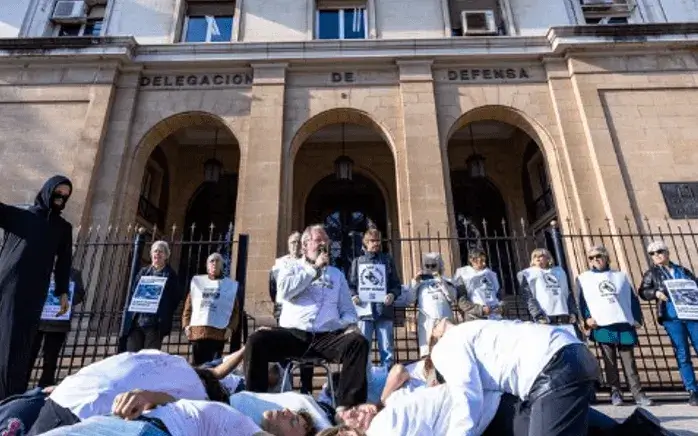After a particularly tough year, the South American country expects 2021 to bring a radical change in its political, economical and social system
‘The times they are a-changin’ Bob Dylan used to sing. A song over 50 years old and whose message is still current. These are changing times, as the reality in Chile well illustrates. The past 25th October, the South American country witnessed a nothing but historical day. Three decades after a plebiscite put an end to August Pinochet’s dictatorship, the Chilean people once again went out to the streets to vote for the drafting of a new constitution.
The current political system, a direct heir to Pinochet’s neoliberal ideology, has been very criticised during these last years, in which it has been surrounded by controversy and a constant repression every time there has been social mobilisations: torture, death, detention, … Violence has been the order of the day and the Chileans, fed up with this situation and increasingly humiliating political decisions, have said it has been enough, standing up and getting a plebiscite that will allow them to write a new Magna Carta.
The results of the vote were overwhelming: with a turnout of about 50%, up to 78% of voters decided to leave the 1980 constitution behind and to draft a new, a priori more democratic constitution in the quest for a social state. ‘A resounding beating,’ says Tomás Rojas, a collaborator with the Irídia Association, ‘which is an indicator of the feeling that exists in Chile, of enormous disgust and discredit against the institutions among the population.’ But how did this situation come about and why didn’t it happen sooner?
Revolution breaks out
If we look back at the recent history of the Latin American country, we might think that it all started a little over a year ago. On 18th October 2019, Santiago and other main Chilean cities entered into a dynamic of mobilizations and protests against the government, which decided, from the first moment and without much consideration, to declare a state of emergency and take the army to the streets.
The spark that ignited what is now known as the ‘social outburst’ was the announcement of a rise in metro fares, which led to the mass departure of hundreds of young people who were dissatisfied with this measure. But that was only the tip of the iceberg. The feeling of contempt and humiliation had not ceased to grow over the past few years among Chileans, who also watched in disbelief as some of the government ministers made totally inappropriate statements.
At the beginning of October 2019, Juan Andrés Fontaine, Minister of Economy, suggested that those who wanted to save money should get off earlier to pay a lower fee. On the other hand, the Minister of Finance, Felipe Larrain, also declared that romantics should be happy since although inflation was lower than expected, flower prices had fallen.
All these statements only heated up an atmosphere that had been suffering for years from hardship, inequality, increasing financial debts, a very low and totally privatised pension system, …
‘There is no doubt that Chile’s economic model of the last decades has generated very outstanding growth and a lot of wealth, reducing “official” poverty in general, but unfortunately this has been done at the expense of working class wages, which are already very low,’ says Chilean economist Marco Kremerman of the SOL Foundation. Currently, more than half of the Chilean workers earn less than 401,000 Chilean pesos, which is approximately 450 euros.
This is in direct conflict with the country’s cost of living, which is very high and unequal between the different regions. ‘Chile is the number one student in Latin America in terms of macros,’ explains Rojas, ‘but the GDP, for example, is very unequal: while the upper class lives very well, the popular sector in the peripheral area has a GDP similar to that of the Congo or Paraguay.’
A poisoned legacy
During the 90s, Chile grew at a very high rate. This growth, however, was mainly in favour of the elite and the wealthy classes. At that time Pinochet was no longer in power, even though he was commander and chief of the army until 1998 and then senator for life, but he had left as his legacy a neoliberal political system that spread out throughout the country well into the second decade of the new millennium.
‘Chile progressively became the liberal Far West of the West,’ says Rojas, ‘with large companies operating without any kind of control and with total impunity, whose decisions directly affected the access to basic services, such as the privatisation of water. Public health, for example, or access to higher education were also victims of social policies that did not take into account the most disadvantaged classes.
Chileans were astonished to see how the various political parties in power, whether right or left wing, showed little interest in making deep changes to the political system or the constitution. As the years went by, as disappointments accumulated and governments kept doing and undoing as they pleased, the feeling of disbelief of a large part of the Chilean population grew and with it the will to take to the streets and change things once and for all.
But the government was breathing easy. Although the discontent was general, the institutional policy had evaluated this feeling and believed it was not dangerous, that it was not articulated, that it was not reflected in social and trade union organisations that could have enough strength to change the whole system. Moreover, a constitutional change was for many but a dream. ‘As long as there was no danger,’ says Kremerman, ‘there would be no change.’
Mobilisations for change
The government’s overconfidence feeling finally clashed with reality. People were fed up with lies and humiliation and ended up taking to the streets in a way they had not done in previous decades. Whereas on 18 October young people had come out to demonstrate against the rise in the metro fare, on 25 October Santiago saw over a million people take to the streets, the largest concentration since 1990.
This demonstration was peaceful, but the tension was still palpable in the atmosphere. Everyone knew that the situation could turn sour in any moment and that the police would end up intervening, as they usually did, with violence. ‘Violence has been an essential part of the security forces, which adds to the feeling of corporate abuse of the elites,’ explains Rojas, ‘and distrust in the police is directly inherited from Pinochet.’
Suppressing any social protest has not only been a matter of the current Piñera government, but has also been part of the political system of the previous parties. ‘In the face of any kind of protest, it is repressed with force,’ says Kremerman. ‘It is repressed so that the model does not change. And it has been repressed to insane levels, because there is a problem with the forces of law and order. How is it possible that people mobilise for a better country, and they are repressed so strongly, they have fear put into their bodies so as to stop them from going out to protest?’
The results of the police violence speak for themselves: during the demonstrations in 2019 and early 2020, up to 34 people were killed, more than 8,000 were arrested, hundreds injured, …
The solution: a new constituent process
The situation was therefore unsustainable, and the possibility of holding a plebiscite to draft a new constitution arose mainly as an act of defence by the political parties that have governed the country for the past decades. ‘In view of the desperation of Chilean society,’ Kremerman explains, ‘the political class decided to reach an agreement to provide an institutional solution to the general discontent and the political and social crisis that exists in Chile.’
This institutional solution, in the form of a plebiscite for a new constitution, established a roadmap that set April 2020 as the deadline for holding the referendum. But a global pandemic delayed all plans, and the vote ended up being held three weeks ago, with almost 80% of the votes in favour of the new constitution.
The next step has a deadline of January 11, 2021, until which all those who wish to be part of the 155-delegate commission that will draft the new constitution can apply. A commission that wants to be the first to be totally equal, and where independent people with representation of the indigenous people can be included. From then until April 11, the election campaign will be launched, and once the 155 delegates have been chosen, they will have a whole year, until April 11, 2022, to write the new constitution.
‘It is at the moment of beginning to draw up the new Magna Carta that the differences between the delegates will arise,’ says Rojas, ‘because obviously the 80% who voted in favour of the new constitution will not all agree with the articles to be included. There will be a struggle between the old and the new politics, and we will see who wins.’
For an article to be approved and included in the new constitution, two thirds of the delegates in favour will be required. And this, according to Kremerman, will be the most difficult. The chances that people who somehow embody the transformative spirit that Chile is calling for will be chosen are very low. Therefore, the probability of the constitution being changed will also be very low. ‘If more than a third of the delegates end up being from the lifelong parties, the changes that will be achieved will be in a very small minority,’ the economist said.
This is why a change is needed in what Kremerman calls ‘the rules of the game’, which have remained on the side of the traditional parties during the last decades: ‘if these rules are not changed, the process is seriously threatened. Social mobilisations will again be very important in the coming weeks to bring about real change and to stop the process from being so elitist.’
The effect of the triumph of the plebiscite, however, can be a double-edged sword. According to Kremerman, ‘on the one hand, it brought a certain element of calm, of being able to say “we have won something” and this is calming the mobilisations and the unrest, but at the same time there are voices that are already warning that the rules of the game are being negotiated to prevent the new constitution from bringing about real change.’
Part of the population does not have any knowledge of what these criteria are to define how constituents will be chosen and how the articles of the new constitution will be drafted. Time is now a vital element, as there are only two months left until the end of the term to apply as a delegate. It is very little time and requires negotiations between political forces that have been at odds for a long time. ‘They have to agree now in order to make a deal,’ Kremerman explains, ‘but the question is how, as in all these decades they have not succeeded.’
A hopeful future?
‘This 2020 has been a particularly long year for Chile,’ Rojas comments with an air of discouragement, ‘first with the protests and the social movement and then with the Covid-19 pandemic, but we are beginning to see the whole new process with hope. That the turnout in the vote three weeks ago was around 50%, in times of pandemic, can only be considered a success, an indication of how Chilean society is doing and the desire it has for change.’
It has been thirty years of ‘democracy’ that the Chilean people have experienced with bitterness, seeing the neoliberal doctrines left by Pinochet’s military regime spread to all sectors, giving much power to a conservatie and wealthy white elite that remains the second great enemy to be defeated.
Now it will have to be seen whether there is life beyond this proposed new constitution. If, as many Chileans hope, the plebiscite of 25 October was the first (small) step towards bringing about a necessary change. Or if, as many others suspect, the proposal for the new constitution was merely an anaesthetic administered by the government to calm the Chilean people and continue to cast the shadow of a dictatorship that has spread out of control.









Add new comment